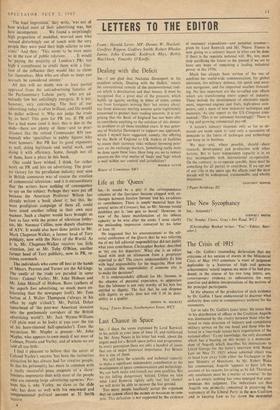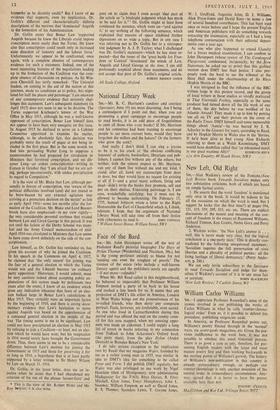The Crisis of 1915 SIR.--Dr. Gollin's resounding declaration that my
criticisms of his version of events in the Ministerial Crisis of May 1915 constitute 'a want of judgment deplorable in a historian of high and genuine achievements' would impress me more if he had pro- duced, in the course of his two long letters, any contemporary evidence .to substantiate his very assertive and definite interpretations of the motives of the principal participants.
In the absence of the production of such evidence by Dr. Gollin, I have endeavoured to discover what authority does exist.in contemporary archives for his statements.
Let us take Dr. Gollin's latest letter. He states that 'in his distribution of offices in the Coalition Asquith was dominated by the rivalry between those who be- lieved in state direction of industry and compulsory military service on the one hand, and those who be- lieved in a free-trade laissez-faire organisation of the national effort.' To my knowledge, the only document which has a bearing on this matter is a memoran- dum of Asquith which describes his instructions to Lloyd George for the latter's interview with Honor Law on May 25, 1915, whose admitted object was to head Law away from either the Exchequer or the new Ministry of Munitions. As Mr. Robert Blake has commented, Asquith 'appears to have left no account of his reasons for acting as he did. Therefore any conclusion must be a matter of surmise.' So far as I am aware, nothing has since emerged that com- promises this judgment. The indications are that Asquith was primarily concerned in preserving the supremacy of the Liberal Party in the new Coalition and in keeping Law as far down the ministerial
hierarchy as he decently could.* But I know of no evidence that supports, even by implication, Dr. Gollin's different and characteristically definite descriptions of the motives that 'dominated' Asquith in the formation of his Administration.
Dr. Gollin states that Bonar Law 'supported Asquith because he knew the Liberals could impose conscription more easily than the Tories. He knew also that conscription could result only in increased state direction of industry and the labour force.' Unfortunately we appear to be confronted, once again, with a complete absence of contemporary evidence for such a statement. Indeed, one of the most interesting features of the negotiations leading up to the formation of the Coalition was the com- plete absence of discussions on policies. As Sir Win- ston Churchill has tartly remarked: 'The Unionist leaders, on coming to .the aid of the nation at this juncture, made no conditions as to policy, but stipu- lated for half the places and patronage.' I am unaware of any contemporary evidence that seriously chal- lenges this statement. Law's subsequent statement (in April 1917) does not seem to me to be decisive. The Tories supported Kitchener's tenure of the War Office in May 1915, although he was a well-known opponent of conscription. Bonar Law himself does not appear to have been very energetic on this issue. In August 1915 he declined to serve on a Cabinet Committee appointed to examine the matter, although, to be absolutely fair, this decision was probably more the result of pique at not being in- cluded in the first place. But in the same month we find him persuading Walter Long to suppress a memorandum he had prepared for circulation to Ministers that favoured conscription, and we dis- cover Long—an ardent conscriptionist—writing to Carson in October that 'I am afraid that we are act- ing, perhaps unconsciously, with undue precipitation in regard to Compulsion.'
It is the view of Mr. Blake that Law, although per- sonally in favour of conscription, was 'aware of the political difficulties involved (and) did not intend to be brow-beaten by any external agitation into arriving at a premature decision on the matter' as late as early April 1916—some ten months after the for- mation of the Coalition. Mr. Blake and Lord Beaver- brook have also emphasised—in my view rightly— the very considerable personal coolness that existed between Law and Lloyd George in this period. It was not until the failure of the Derby Scheme was mani- fest and the Army Council memorandum of mid- April 1916 was circulated to Ministers that Law seems to have come down definitely on the side of the con- scriptionists.
Law himself, as Dr. Gollin has reminded us, has given his account of why he joined the Coalition. In his speech in the Commons on April 4, 1917, he claimed that 'the only reason' for joining was the fear of a general election in which the Tories would win and the Liberals become 'an ordinary party opposition.' Historians, I would submit, must be very cautious indeed about accepting public ex- planations of this nature made by politicians two years after the event; I know of no evidence which
gives any indication whatever that fears of an elec- tion bulked large in Bonar Law's calculations in
May 1915. They certainly were an important factor by the beginning of 1916, and there is strong docu- mentary evidence that Law's hesitation to move against Asquith was based on the apprehension of a contested general election in the middle of the war. The timing seems to me to be significant. Law could not have precipitated an election in May 1915
by refusing to join a Coalition—at least, not an elec- tion which he would have won; but his resignation
in 1916 would surely have brought the Government down. Thus, there seems to me to be a considerable difference between Law's motives for joining the Government in 1915 and those for preserving it for so long as 1916, a hypothesis that is at least partly supported by a letter written to Sir Henry Wilson by Law on March 31, 1916.
Dr. Gollin, in his latest letter, does me an in- justice when he states that I had abandoned my criticism of his use of the phrase laissez-faire' and * This is the view of Mr. Robert Blake and Mr. Roy Jenkins; it is also mine.
goes on to claim that I even accept 'that part of the article as "a hindsight judgment which has much to be said for it."' Dr. Gollin might at least have continued the sentence, which went on—`and against it,' to say nothing of the following sentence, which explained that reasons of space inhibited further digressions on so wide a topic. But in any case I was referring not to Dr. Gollin but to a retrospec- tive judgment by A. J. P. Taylor; what I challenged was Dr. Gollin's statement—which he has since re- peated—that the issues of the 'great battle for Free- dom or Control' dominated' the minds of Law, Asquith and Lloyd George at the time. I 'am still profoundly sceptical about these statements, and do not accept that part of Dr. Gollin's original article.
All Souls College, Oxford
ROBERT RHODES JAMES











































 Previous page
Previous page